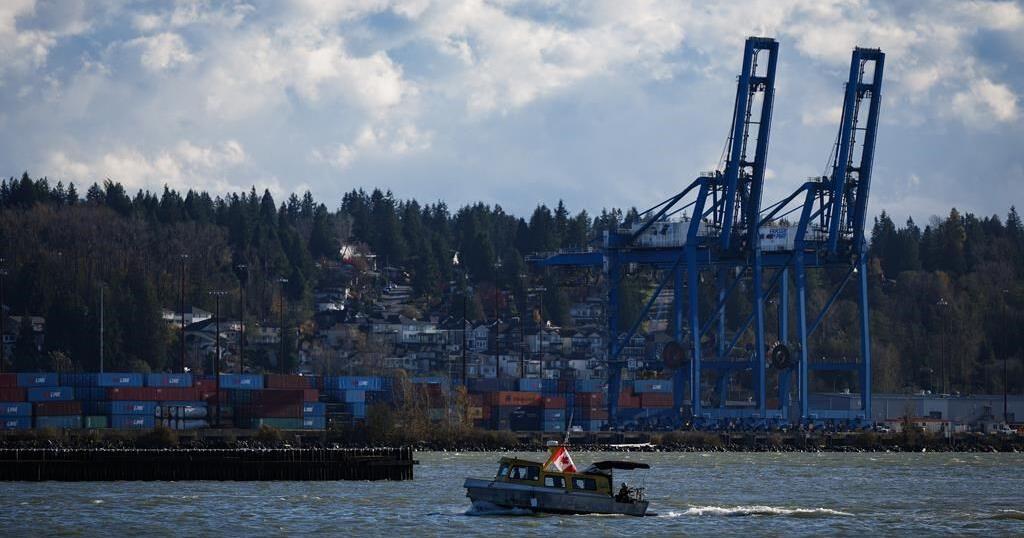VANCOUVER – British Columbia’s businesses leaders are urging port employers and more than 700 unionized workers to resolve their dispute immediately as a lockdown paralyzes shipping along Canada’s west coast.
The BC Maritime Employers Association says no negotiations are scheduled a day after it launched what it calls a defensive lockout against members of the International Longshore and Warehouse Union Local 514.
Locked-out workers have begun picketing outside terminals around the province, most of them in Metro Vancouver but also including about 70 workers in Prince Rupert and 20 in Nanaimo.
Dozens of workers wearing signs and waving blue union flags have set up a tarp shelter with folding chairs at the entrance of Neptune Terminals in North Vancouver, B.C., cheering as passing vehicles honked in support.
Greater Vancouver Board of Trade president Bridgitte Anderson says the work stoppage at the Port of Vancouver — Canada’s largest — comes at a critical time for the economy, and her organization is calling on the federal government to “intervene immediately.”
BC Chamber of Commerce president Fiona Famulak is urging employers, the union and Ottawa to “diligently to find a resolution quickly” to avoid inflicting any more harm on the Canadian economy.
“The BC Chamber of Commerce supports the right to collective bargaining,” Famulak said in a statement. “However, the inability of the ILWU and BCMEA to negotiate a new agreement and avoid another work stoppage at Canada’s largest port is disappointing.
“Our port infrastructure is too critical to the health and success of businesses and workers to have this dispute continue one moment longer.”
The employers and the workers represented by Local 514 have been without a contract since March 2023.
The dispute is over issues including port automation being introduced by port terminal operator DP World and what it would mean for unionized worker staffing levels.
There had been several days of mediated talks last week in an attempt to break the deadlock, but a “final offer” from the employers resulted in the union responding with a notice for strike action, which prompted the employers to lock out workers starting Monday.
The union has called the provincewide lockout an overreaction to its plans for implementing only an overtime ban, adding that it believes the employers are trying to force the federal government to intervene.
The employers, meanwhile, said they had to lock out workers because a strike notice allows the union to escalate job action without notice.
The employers association also said its final offer — which remains on the table — included a 19.2 per cent wage increase over a four-year agreement ending in 2027 and presented a fair deal “that recognizes the skills and efforts of 730 hard-working forepersons and their families.”
The union said the offer did not address its concerns over minimum guaranteed staffing requirements, given that port automation has been introduced.
Union president Frank Morena has said the union’s negotiators are ready to re-engage in talks at any time.
The lockout is the latest in a number of disruptions at the Port of Vancouver this year, with a work stoppage at both major national railways and pickets going up at grain terminals hindering shipping through the port in the summer and fall.
A 13-day strike froze trade through B.C. ports in July 2023.
Anderson said the Greater Vancouver Board of Trade launched a Port Shutdown Calculator during the 2023 work stoppage to illustrate the economic costs, and the web page had been relaunched in the latest dispute.
“It is imperative that the Canadian government prioritizes economic growth, supply chain, stability, trade and investment, particularly at this critical time,” Anderson said, noting the U.S. presidential election and the likelihood of protectionist policies requiring Canada to up its game in the global trade market.
“We need to ensure that we show we have stable supply chains and that we are a reliable trading partner and that our economy is growing,” she said. “That has not been the narrative over the last couple of years, and so it is very concerning.”
The Board of Trade said the latest port shutdown would disrupt $800 million worth of goods daily, with every hour of the closure fuelling inflation.
This report by The Canadian Press was first published Nov. 5, 2024.
